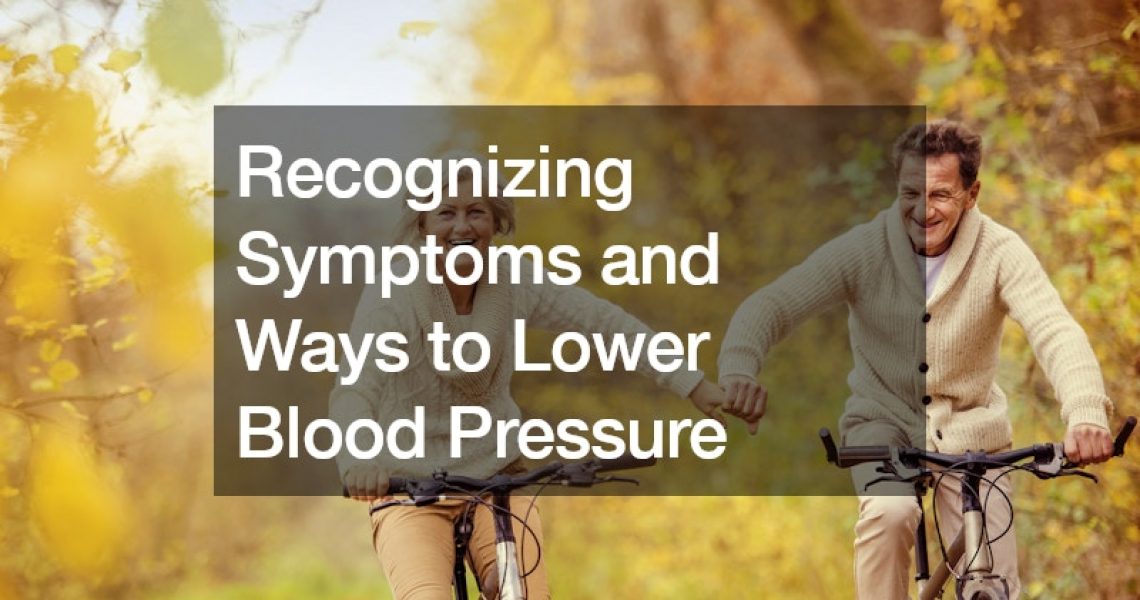High blood pressure, also known as hypertension, often lurks without noticeable symptoms, earning its reputation as the silent killer. This condition can silently damage your body over time, even when you feel perfectly fine. Understanding how to recognize symptoms and adopt healthy practices to lower blood pressure is crucial for maintaining long-term health.
Understanding High Blood Pressure
High blood pressure refers to elevated levels of pressure in the arteries, which can lead to serious health complications if left untreated. It’s typically measured in two numbers: systolic pressure (when the heart contracts) and diastolic pressure (when the heart relaxes).
A normal blood pressure reading is generally considered to be below 120/80 mmHg.
Symptoms of High Blood Pressure
One of the challenging aspects of hypertension is that it often presents no symptoms in its early stages. However, in severe cases or during hypertensive crises, symptoms may include headaches, blurred vision, chest pain, and shortness of breath. These symptoms warrant immediate medical attention to prevent complications.
Effects of High Blood Pressure on the Body
Consistently elevated blood pressure can cause significant damage to various organs and systems in the body. It thickens and narrows the arteries, making it harder for blood to flow freely. This increased strain on the heart and blood vessels can lead to conditions such as heart disease, stroke, kidney disease, and vision problems. Understanding these potential effects underscores the importance of managing blood pressure effectively.
Monitoring and Managing Blood Pressure
Monitoring blood pressure regularly is essential for early detection and management. Aiming to keep blood pressure within a healthy range (usually between 120-140 mmHg systolic and 80-90 mmHg diastolic) is crucial. Lifestyle modifications play a pivotal role in achieving this goal.
Lifestyle Changes to Lower Blood Pressure
Several lifestyle adjustments can help lower blood pressure naturally:
- Regular Exercise: Engaging in aerobic exercises like brisk walking, swimming, or cycling for at least 150 minutes per week can significantly reduce blood pressure.
- Healthy Diet: Adopting a diet rich in fruits, vegetables, whole grains, and low-fat dairy products while limiting salt intake can aid in blood pressure management.
- Reducing Alcohol Consumption: Limiting alcohol intake or abstaining altogether can lower blood pressure levels.
- Weight Management: Maintaining a healthy weight through diet and exercise can reduce the risk of hypertension.
- Stress Management: Techniques such as meditation, yoga, and deep breathing exercises can help manage stress levels, contributing to better blood pressure control.
Medical Treatments for High Blood Pressure
In some cases, lifestyle modifications alone may not suffice, and medications may be necessary to control blood pressure effectively. Medications prescribed by healthcare providers can help relax blood vessels or reduce the volume of blood your heart pumps, thus lowering blood pressure. It’s crucial to follow your doctor’s advice regarding medication use and never stop taking prescribed medications without consulting them first.
When to Seek Medical Attention
Regular blood pressure checks are recommended, especially if you have risk factors such as a family history of hypertension, obesity, or a sedentary lifestyle. If you experience symptoms like severe headaches, chest pain, vision changes, or shortness of breath, seek immediate medical attention. Prompt intervention can prevent complications associated with high blood pressure.
Complications of Untreated Hypertension
Untreated high blood pressure, or hypertension, can lead to severe health complications affecting various organs and systems in the body. Over time, the constant force of blood against arterial walls that are hardened or narrowed due to hypertension can cause significant damage. One of the primary concerns is heart disease, where hypertension contributes to the thickening of the heart muscle and the development of conditions like coronary artery disease and heart failure. These conditions increase the risk of heart attacks and other cardiovascular events.
Role of Stress and Mental Health in Hypertension
Chronic stress and mental health conditions like anxiety and depression can significantly impact blood pressure levels. When a person experiences stress, the body releases hormones like adrenaline and cortisol, which temporarily increase blood pressure as part of the body’s fight-or-flight response. However, chronic stress can lead to sustained high blood pressure over time.
Preventive Measures and Awareness
Preventing high blood pressure involves early detection, regular monitoring, and proactive lifestyle adjustments. Educating yourself about the risks and symptoms of hypertension empowers you to take control of your health. By adopting healthy habits and seeking timely medical advice, you can significantly reduce the likelihood of developing hypertension-related complications.
Conclusion
High blood pressure is a common but serious health condition that requires proactive management and awareness. Recognizing the symptoms and understanding the importance of maintaining healthy blood pressure levels through lifestyle modifications and, when necessary, medical intervention is key to preventing long-term health complications. By taking steps to lower blood pressure and adopting a heart-healthy lifestyle, you can safeguard your well-being and enjoy a healthier life.
.


